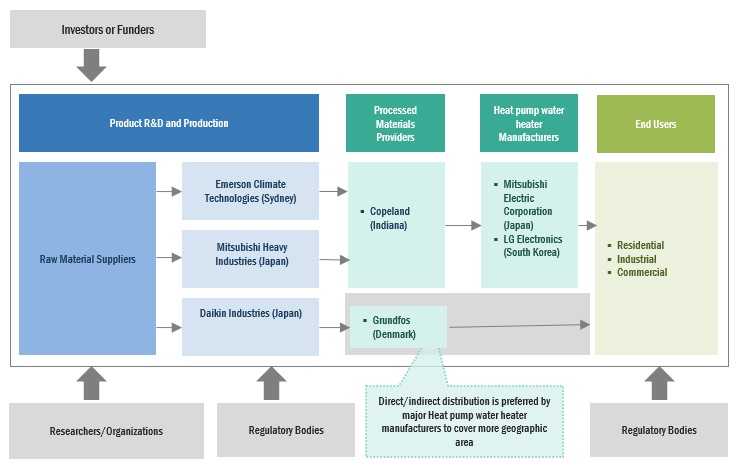New Revenue Pockets:
The global heat pump water heater market is projected to reach USD 10.2 billion by 2028 from an estimated USD 5.2 billion in 2023, at a CAGR of 14.4% during the forecast period. Technological advancements, environmental concerns, energy efficiency goals, and regulatory policies accelerate the growth of the heat pump water heater market. This report segments the heat pump water heater market based on type into five categories: air-to-air heat pump water heater, air-to-water heat pump water heater, water source heat pump water heater, ground source (geothermal) heat pump water heater, and hybrid heat pump water heater. The air-to-air heat pump water heater is expected to be the fastest-growing segment as it holds low operating costs. Air-to-air systems typically boast lower installation costs compared to alternatives like ground-source units. This affordability makes them a popular choice. Air-to-air heat pump water heaters are adaptable for installation in various settings, both indoors and outdoors, providing flexibility for diverse environments.
Key Market Players
The major players in the heat pump water heater market include Panasonic Corporation (Japan), LG Electronics (South Korea), Johnson Controls–Hitachi Air Conditioning (Japan), Mitsubishi Electric Corporation (Japan), and Trane Technologies plc (Ireland).
Download PDF Brochure: https://www.marketsandmarkets.com/pdfdownloadNew.asp?id=22529761
Based on the rated capacity segment, the heat pump water heater market is segmented into six categories: up to 10 kw, 10–20 kw, 20–30 kw, 30–100 kw, 100–150 kw, and above 150 kw. Up to 10kw is expected to be the largest segment during the forecast period. Manufacturers opt for refrigerants that are easy to handle and maintain, reducing complexities and ensuring the longevity of the heat pump water heater. Ongoing technological advancements may impact refrigerant choices, with manufacturers considering newer, environmentally friendly options with improved performance characteristics.

This report segments the heat pump water heater market based on refrigerant type into four categories: R410A, R407C, R744, and others. R410A is expected to be the fastest growing segment during the forecast period. R410A is a hydrofluorocarbon (HFC) refrigerant that does not contain chlorine, making it environmentally friendly and compliant with regulations aimed at reducing ozone depletion and global warming potential. Additionally, R410A has a higher energy efficiency compared to its predecessors, contributing to the overall energy efficiency of heat pump water heaters. Furthermore, R410A offers improved heat transfer characteristics, allowing for better performance and heat exchange in various temperature ranges.
This report segments the heat pump water heater market based on storage tank capacity into three categories: up to 500 liters, 500–1,000 liters, and above 1,000 liters. Up to 500 liters segment is expected to be the fastest growing segment during the forecast period. The prevalence of a 500-litre storage tank capacity in the heat pump water heater market can be attributed to a thoughtful equilibrium between efficiency, usability, and consumer demand. This specific capacity has gained popularity due to its ability to efficiently supply hot water for the typical household’s daily needs while optimizing energy consumption. The 500-liter tank strikes a balance that ensures an abundant hot water supply without unnecessary excess, which could result in energy wastage. Its size aligns well with the dimensions of residential properties and fits conveniently into available spaces.
Request Sample Pages: https://www.marketsandmarkets.com/requestsampleNew.asp?id=22529761
Based on the end-user segment, the heat pump water heater market is segmented into three categories: residential, commercial, and industrial. The Residential segment is expected to be the fastest-growing segment during the forecast period. The adaptability and compact design of these systems not only make them well-suited for a variety of living spaces within the residential sector but also underscore their versatility in seamlessly integrating with diverse architectural layouts and spatial constraints. Whether installed in compact apartments, spacious single-family homes, or multi-story residences, the compact footprint of heat pump water heaters ensures minimal space requirements.


